by Carol Dixon
To go on pilgrimage isn’t to withdraw from the world, rather it is a way of setting aside time to spend with God in order to reinvogorate our souls and get ‘God’s eye view’ on life.
In steps of saints from long ago who came to serve on this small isle, we tread the pilgrim path and draw apart from daily work awhile.
We share our journey on the way with others searching too for peace, and find God present in each one who honestly and humbly seeks.
We long for space to hear God’s voice, and find it in the milling crowd as well as hushed in holy church at prayer, in silence and aloud.
We gaze upon the sunlit sea, or stroll along in mist and rain, rejoicing that our God is seen and understood in joy and pain.
In steps of saints we travel on, forever changed, yet still the same; we serve and follow in Christ’s way in daily work, to praise his name.
(Words © Carol Dixon. Music © Greta Wrigley)
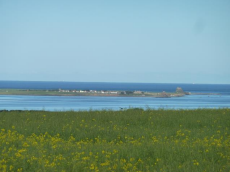
The holy island of Lindisfarne, photo by D. Dixon
One of my favourite books about Saint Cuthbert is David Adams’ Fire of the North in which David tells the story of Cuthbert’s life. It is a very moving and evocative account of the Northumbrian patron saint who was embraced by the whole of England after his death because of his example of holiness and humility. I have been looking through this lovely book again recently and the Chapter that caught my eye was entitled “Plague Days” which seemed very pertinent for our times. After his call to become a monk, Cuthbert joined the Abbey at Melrose as a novice, but his particular skills soon caught the Abbot’s attention and he was sent to set up a new Foundation in Ripon.
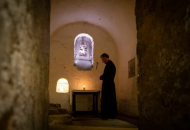
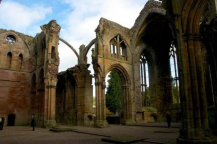
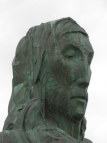
Anglo-Saxon crypt Ripon cathedral (Photo: used by permission) Melrose abbey (Photo: © Jo Woolf’ Used with permission) Cuthbert statue, Holy Island (Photo: C Dixon)
Because of his love of welcoming strangers, Cuthbert was appointed as guest-master and his commitment to prayer and praying for others for many hours at night gave him great joy. Unfortunately, dark clouds were gathering on the horizon. The Celtic mission was falling out of favour and when Wilfred arrived from Rome with a group of monks intending to follow the Roman tradition of worship, Cuthbert and his Celtic Christian brothers were expelled from Ripon and had to return to Melrose.
As they journeyed north Cuthbert felt weary- sad at heart, low in spirit, and exhausted in body. On top of everything, Cuthbert had caught the plague which was raging through the entire country as well as further afield in Europe. This yellow sickness had caused the death of many in the population and day by day Cuthbert was getting weaker. As he lay in bed in his cell the brothers prayed for him all night and when one of the younger novices came to see if Cuthbert needed a drink and told him that the whole of Melrose was praying for him Cuthbert said ‘why then do I lie here for I do not doubt that God has listened to the prayers of many good men; give me my shoes and staff.’ Although very weak he went to the Abbott, his dear friend who was dying of the plague and sat with him as they read the Gospel of John together.

St John the evangelist in the Lindisfarne Gospels. From the British Library.
Cuthbert was saddened to hear that he had been chosen to succeed Abbott Boisil, as it was his desire to become a hermit but bowing to the greater knowledge and grace of God he took up the reins of leadership and led the Abbey for many years before his call to become Bishop of Lindisfarne. Although he was happy at Melrose, he longed for the solitude of the small islet, Hobthrush just off the shore of the Northumbrian island close to his heart and he often repeated the words of a saint Columba from Iona:
‘Delight it would be for me, to be on a pinnacle of rock that I may often see the face of the ocean deep, that I might watch its heaving swell when foaming white horses chant music to the Father upon their course. That I might look at its sparkling shore and hear the thunder of the watery waves and its constant ebb and flow.’
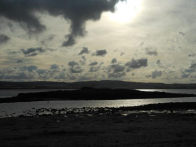 Hobthrush, later known as Cuthbert’s Isle (Photo: C Dixon)
Hobthrush, later known as Cuthbert’s Isle (Photo: C Dixon)
My friend Rose Reeve wrote a musical ‘Cuthbert, Bishop of Lindisfarne’ based on his life and ministry. One of the most beautiful songs from it is Whisper of Peace. (Words below – apologies for sound quality, as recorded live in church)
Whisper of Peace
Sea, rhymical and raging, Roars, harsh of voice, demanding, Ruthless, unrelenting, Rushing at rocks and carving channels, Wild movements never cease.
Sea, calm in early sunlight, Blue gentle waves and shimmering light. Smoothest sand and flowing tides, Foaming and white, stretch out to touch the shore; Soft voices whisper, ‘Peace’.
Birds, white and wheeling overhead, Seals weaving through the water, Silver fish dart through the deep, Rock-pools that teem with tiny creatures, Everything has its place.
Home, isle of contemplation, Man, lone, but one with sea and sky, Friend to otter, bird and seal, Watching the slowly circling seasons, While sea songs whisper, ‘Peace’.
© Words & Music Rose Reeve.
On St Cuthbert’s day this year (20th March) as we recover from this worldwide plague of our time and learn to live with Covid all around us, let us take heart and rejoice with St. Cuthbert whose Faith, compassion, and years of service resonate down the ages.
Featured Photo St Cuthbert’s Isle, off Holy Island (Photo: C Dixon)
As an Amazon Associate I receive a small amount for purchases made through appropriate links. Thank you for supporting Godspace in this way.
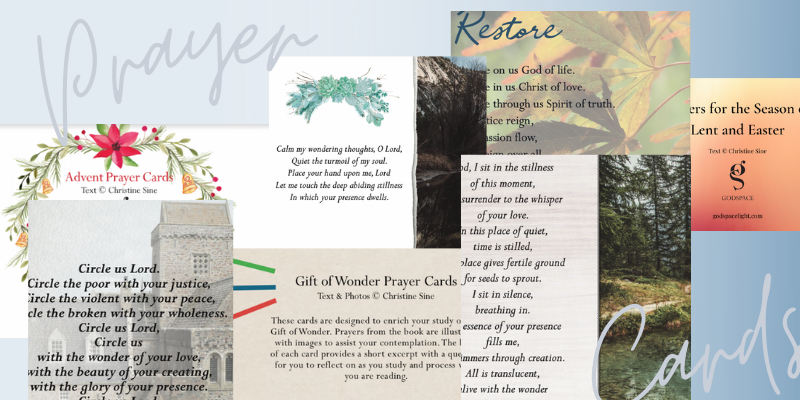 Prayer cards are available in the shop for many occasions and seasons–from everyday pauses and Lenten ruminations to breath meditations and Advent reflections, enjoy guided prayers and beautiful illustrations designed to delight and draw close. Many are available in single sets, sets of three, and to download–even bundled with other resources!
Prayer cards are available in the shop for many occasions and seasons–from everyday pauses and Lenten ruminations to breath meditations and Advent reflections, enjoy guided prayers and beautiful illustrations designed to delight and draw close. Many are available in single sets, sets of three, and to download–even bundled with other resources!

